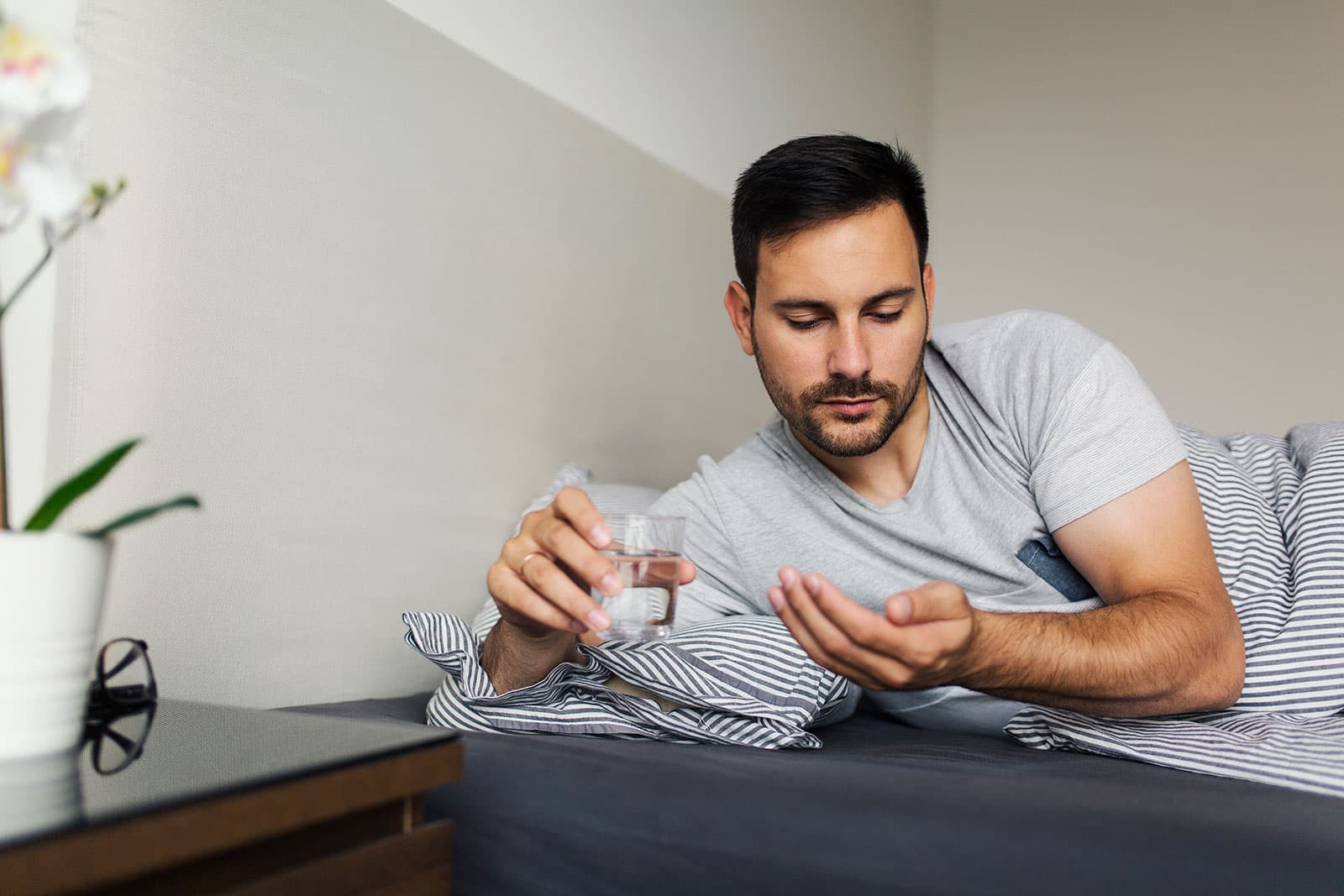Nearly everyone has struggled with sleep at some point in their life. Sometimes, the difficulty is short-lived. You might be going through a stressful time, and when the stress is relieved, your sleep returns to normal. However, if the stress is ongoing or your sleep problems do not seem to have any particular external cause, you might also find that you have developed chronic insomnia.
This can make it difficult to function in your day-to-day life, and you might have to turn to sleeping pills for relief. However, there are some dangers associated with the use of sleeping pills, including habit-forming, sleeping pill addiction, and the possibility of overdose.
In addition, you can become dependent on sleeping pills. This is why there is often a warning on the label about the danger of using them over a long period of time.
Table of Contents
- How Do Sleeping Pills Work?
- What Are the Side Effects of Sleeping Pills?
- What Types of Sleeping Pills Could Lead to Overdose?
- How Does an Overdose Happen?
- What Are the Risks Associated With an Overdose of Sleeping Pills?
- Are You Addicted to Sleeping Pills?
- Withdrawal From Sleeping Pills
- Treatment for Sleeping Pill Addiction
How Do Sleeping Pills Work?
Most sleeping pills, such as zolpidem (z-drugs), are a type of sedative. At lower doses, they slow your central nervous down enough to relieve anxiety and help you sleep. The reason that they are effective is the same reason that they are dangerous at higher doses: Your brain function or breathing could be slowed down to a deadly degree.
There is also a danger of substance abuse associated with sleeping pills in the benzodiazepine (sedative-hypnotics) class of drugs, which includes Xanax and Ativan. Another class, known as hypnotics, is less likely to be addictive. However, there is a danger of suffering from substance use disorders even with over-the-counter sleeping pills.

What Are the Side Effects of Sleeping Pills?
You may take sleeping pills to avoid the dangers of trying to function without enough sleep, but sleeping pills can produce side effects to your well-being that are similar to the symptoms of fatigue.
For example, driving while drowsy can be as dangerous as driving under the influence of alcohol. Unfortunately, driving after taking sleeping pills can be dangerous as well. Even the following day, you may experience fatigue and a slow reaction time that can affect your driving.
The morning-after effects of sleeping pills can make you feel groggy and as though you can’t quite wake up, just as you do when you haven’t had enough sleep.
There are other negative consequences of short-term use of sleeping pills as well besides lingering drowsiness. These include:
- digestive issues
- dizziness
- lack of coordination
- difficulty focusing
- trouble speaking (including slurring your words)
- vivid dreams or nightmares
- vision problems
- headaches
You might experience some of the above immediately after using sleeping pills. However, there can be even more serious physical and mental health issues with long-term use:
- memory loss
- anxiety
- depression
- dependence
- sleepwalking
Some studies have also linked some sleeping pills to long-term cognitive difficulties when used by older adults.
If you are pregnant or breastfeeding, sleeping pills could affect your child, and you should not take them without consulting a healthcare provider.
Not everyone is affected by medication in the same way, and this applies to sleeping pills as well. You may use them for a short time until your sleeping disorders resolve and then stop using them without ever having problems.
However, other people eventually find that they cannot sleep without taking the pills and develop drug abuse. They may resort to taking higher dosages than recommended in order to get the same benefits. People may also be in danger of overdosing on sleeping pills, either accidentally or on purpose.
What Types of Sleeping Pills Could Lead to Overdose?
Sleeping pills can be purchased over the counter or are available as a prescription drug. Over-the-counter drugs may be specifically marketed as sleep aids for people having trouble sleeping, or they might be primarily intended for other uses —such as allergic reactions— with a warning on them that they cause drowsiness. However, drugs such as Benadryl or Tylenol PM may have the same active ingredient as over-the-counter sleeping pills.
Some people find that over-the-counter drugs are ineffective and seek prescription sleep aids, which are stronger. These include Lunesta and Ambien. However, they can also have more serious side effects, including memory loss.
There is a danger of overdose with both types of sleeping pills. You should not assume that just because you were able to buy something over the counter, it is automatically safe.
How Does an Overdose Happen?
Overdosing on sleeping pills is not always deliberate, and it is not always simply the result of someone taking more pills than they should.
Here are a few of the ways an overdose could occur:
- using sleeping pills with alcohol
- using sleeping pills with opioids
- taking sleep pills when you have chronic lung problems
- having an allergic reaction to sleeping pills
Sleeping pills may react with other drugs that you are taking in surprising way. Therefore, it is important to be thorough in letting your doctor know what other drugs you use regularly. This includes over-the-counter herbal supplements.
Overdoses can also happen when a person deliberately takes a higher dosage, whether they are doing so because they no longer respond to the recommended dose and are trying to sleep or they are trying to harm themselves.

What Are the Risks Associated With an Overdose of Sleeping Pills?
Overdosing on sleeping medication can be fatal. However, even when taking too many sleeping pills is not deadly, it can lead to serious health conditions. A person who has overdosed may experience some of these symptoms:
- trouble breathing
- vomiting
- dizziness
- inability to wake up
- coma
A sleeping pill overdose can also cause long-term or permanent damage, including a brain injury or damage to other organs in the body.
The number of sleeping pills you have to take for a dangerous or fatal overdose will vary from person and depend on many different factors, including body weight, how accustomed to sleeping pills your body is, and what other substances you may have ingested. However, you could overdose by taking as little as two or three times the recommended amount.
Overdosing on sleeping pills is not common, and for many people, it will only produce mild side effects when the dose is on the low side. but any amount that is more than what is recommended or prescribed to you is unsafe.
To avoid an overdose, you should never take more than is recommended by the directions on over-the-counter medication or by your doctor, and you should not mix your sleeping pills with alcohol or with other drugs without talking to your medical provider first.
If you or a loved one has overdosed on sleeping pills, you may need to seek emergency care.
Are You Addicted to Sleeping Pills?
How do you know if you are addicted to sleeping pills? One clear sign is when you begin taking higher doses in an effort to get the medication to work. Another measure of addiction to any substance is when it begins to affect your day-to-day functioning. However, there may be other signs you should watch out for as well, whether in yourself or in loved ones:
- an inability to stop using the medication
- using sleeping pills recreationally
- extreme mood swings
- extreme fatigue
- doctor shopping for more pills
While a one-time overdose of sleeping pills could be the result of a mistake, an overdose might also suggest a strong likelihood of sleeping pill abuse.
Withdrawal From Sleeping Pills
If you think that you may be suffering from sleeping pill drug addiction, you cannot simply stop taking them in order to end the addiction.
At best, you may simply find yourself unable to sleep at all (rebound insomnia)when you discontinue sleeping pills abruptly instead of tapering off them. However, there are a number of other withdrawal symptoms of sleeping pills, including cravings, anxiety, sweating, a racing heart, irritability, and nausea. You may also experience an increase in your heart rate, breathing, and blood pressure. Sleeping pill withdrawal can even cause hallucinations and seizures.
When stopping the use of sleeping pills, you need to start sleeping pill addiction treatment by tapering off usage slowly, otherwise known as medical detox. This is best done in consultation with your doctor or another medical professional. You could also consult a clinic that specializes in sleeping pill rehab and recovery to find the most effective treatment program for your case.
Treatment for Sleeping Pill Addiction
You can be treated for sleeping pills addiction just as you would be for other substance use problems. Addiction treatment might include a period of sleeping pill detox along with inpatient rehab, intensive outpatient, or outpatient care, or participation in a 12-step program. If you are using sleeping pills to deal with anxiety or similar issues, individual therapy (such as cognitive behavioral therapy) and group therapy may help you better cope with those problems. There are also sleep hygiene solutions that do not involve drugs that can help you get a better night’s sleep.
If you have questions about your sleeping pills’ drug use or treatment options, or think you may be struggling with a sleeping pill addiction, contact Live Free Recovery Services treatment center today. Services are available throughout New Hampshire.
FAQ
Do sleeping pills cause memory loss?
Published on: 2024-01-30
Updated on: 2024-12-18
